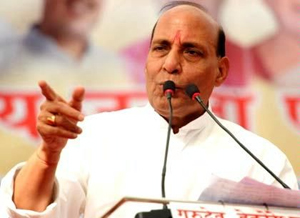 New Delhi, Jul 20: BJP chief Rajnath Singh has stirred up a huge controversy with his comment that English has caused a great loss to India by eroding its cultural values and stymieing the growth of Sanskrit in the country. The comment was greeted with derision by intellectuals and political leaders on Friday.
New Delhi, Jul 20: BJP chief Rajnath Singh has stirred up a huge controversy with his comment that English has caused a great loss to India by eroding its cultural values and stymieing the growth of Sanskrit in the country. The comment was greeted with derision by intellectuals and political leaders on Friday.
Speaking at a function here on Thursday, Singh had said, "The English language has caused a great loss to the country. We are losing our language, our culture as there are hardly any people who speak Sanskrit now."
A television report showed Singh as saying: "We have started forgetting our religion and culture these days. There are only 14,000 people left in this country speaking in Sanskrit. Knowledge acquired out of English is not harmful but the Anglicization penetrated into the youth is dangerous."
It took a while for the BJP chief's remarks to circulate but the reaction would have left his party colleagues wincing as the all-around criticism comes just as the main Opposition is looking to project itself as committed to a modern social order and dynamic growth.
Singh's views sounded like a throwback to when the BJP was often labeled a "Hindi, Hindu, Hindustan" party and not one that claims to have nurtured the IT revolution to its full potential during Atal Bihari Vajpayee's tenure as the prime minister.
Singh's critics, ranging from I&B minister Manish Tewari, CPM leader Sitaram Yechury and Dalit ideologue Chandrabhan Prasad, were quick to point out that Singh had betrayed his medieval world-view while insisting that English has not wiped out "Indianness".
For most Indians English is an additional skill apart from their mother tongues. Facility in English is seen to have allowed India to connect with the world and given it a critical share of the BPO and IT business which provides employment to more than 20 lakh people, Singh's critics said.
Tewari said, "I sometimes feel like laughing at our friends. On one side their vision document is outsourced to people who don't speak any language other than English. Is this medievalism or hypocrisy?"
Tewari pointed out that "This attempt to create a dispute over language or saying that one language is better or worse that another, doesn't strengthen the country and is not expected from a responsible political party."
CPM leader Sitaram Yechury criticized Singh saying the comments reflect the BJP chief's preoccupation with Hindu revivalism. He said that just by learning a language, people don't lose cultural roots or foundations. "For most Indians, English is an additional language, and it does not insulate or separate people from their identities," he said. Knowing English will only help Indians to advance and develop further.
Dalit ideologue Chandrabhan Prasad also criticized Rajnath Singh, saying BJP was opposed to English language as it is at odds with modernity itself. "All things Indian by tradition, be it caste, be it social structure, political structure, have stopped India from growing into a modern society. If English is eliminating tradition, it is also eliminating a culture that is caste-driven," he said.
"I am not surprised that BJP is upset. The party cannot succeed in a caste-neutral India. It is opposing English because of its opposition to modernity itself," he said.





Comments
Add new comment